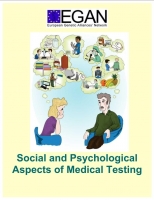FAQ on social and psychological aspects of medical testing
 For patients and families an accurate diagnosis, delivered in a timely manner with user-friendly explications, can be the key to understanding their condition. It can enable them to make effective plans for the management of their condition. This is important not only for the person affected, but also for those around them who may also find themselves at risk – be it because the condition may be genetic or infectious, or because it may impose demands related to the care and support that the affected individuals may need as their disease progresses.
For patients and families an accurate diagnosis, delivered in a timely manner with user-friendly explications, can be the key to understanding their condition. It can enable them to make effective plans for the management of their condition. This is important not only for the person affected, but also for those around them who may also find themselves at risk – be it because the condition may be genetic or infectious, or because it may impose demands related to the care and support that the affected individuals may need as their disease progresses.
Recent advances in diagnostics increasingly permit a precise and nuanced opinion as to a patient’s condition and their likely prognosis. This greater scientific and clinical clarity allows for a more personalised approach to healthcare. At the same time, it implies a growing need for social and psychological support that patients and families require if they want to fully understand their condition and effectively address the consequences that may arise in non-medical areas.
This leaflet aims to provide ideas and guidance for patients and families who are offered diagnostic or predictive medical testing of one sort or another. It builds on the shared experience of patients and professionals who seek to explain the many and varied social and psychological consequences that may be generated by diagnostic testing programmes. In this way we hope that it will be possible for patients and their families to engage with their doctors as equal partners, making better, more informed choices when facing the suggestion of diagnostic or predictive testing that result from awareness of medical risk.
This brochure is available in English.
